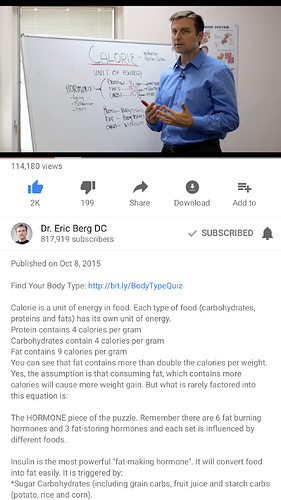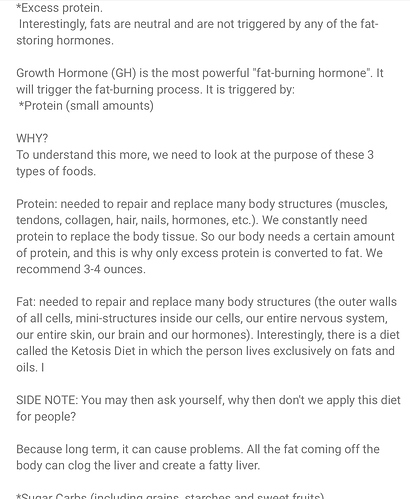I think he would in fact say “why eat that crap…”
Great write up by Dr. Jason Fung
Probably would. Yet it’s natural to think and wonder about things, and perhaps in this day and age of tweets,140 characters and bumper-sticker mentality, Dr, Fung chooses to aim for the masses (with their apparently lowered attention span) and not worry about being as complete or in-all-cases-correct as a more detailed and less-frequent blog could be.
He’s human like the rest of us, and given how important I think his basic message and tenets are, I will cut him a ton of slack. We can figure out some things on our own, or decide to what degrees they are currently unknowable, all the while benefitting from Dr. Fung’s approach.
There are lucky people who can eat excessive calories day after day and still lose weight. I’m not one of those lucky people. I did ZC for 18 weeks without cheating once during which time I ate in the neighborhood of 2-2.5 lbs meat a day. Considering before I started ZC I would normally easy about 1350 cals a day, my ZC diet was calorically excessive. I gained 24 pounds of fat. I can only conclude that in my case, calories mattered.
I like Dr. Attia’s explanation of the calorie question better. http://eatingacademy.com/nutrition/do-calories-matter
That’s very much my position too. ‘Who is the audience that he is trying to reach with this particlar essay?’
I’ve always found him to be consistent, and a pretty decent writer, with the ability to tailor a rather complex subject matter to John Q. Public, to savvy readers, to his own blog readership all with equal readability.
Thanks for sharing that & for the reminder. There is so much variability in metabolism even among us here.
I wonder why you were getting such a huge insulin response off of meat? Was it lean or fatty meat?
Do you lift weights regularly? One thing that most of these people who try high calorie keto seem to have in common is they do resistance training of some kind. I wonder if lifting weights in some way reduces the insulin response from eating protein?
Fung is correct in what he is saying as it relates to the common Western understanding of calories and I think that is what he is really trying to communicate and debunk. Calories per se don’t count, it’s the whole complexity of metabolism and is not simply calories in/calories out determines health and weight loss. I think it is a first step in changing the dialogue and he knows that.
Dr. Fung gets it right in that different sources of calories engender different metabolic responses.
Dr. Fung gets it wrong when he dismisses energy content, as in calories don’t count, as a parameter.
People are not stupid, OK some people are not stupid, but many people do not think critically, don’t question. Dr. Fung’s simplification of the problem might be somewhat less detrimental then is the CICO misrepresentation, but it is neither beneficent or benign.
Understanding the history of dietary advice over the last several decades, I think people offering dietary advice need to be very careful to be as correct as possible and not to just simplify what is going on because they think the general population is just stupid and will never comprehend the science. The public has been treated like that for decades.
Keto for Life!
Richard
Best explanation on planet earth!
CALORIES (units of energy)
UNIT OF ENERGY TABLE (per gram):
CARBOHYDRATE 4 units
FAT 9 units
PROTEIN 4 units
= HORMONAL\ENDOCRINOLOGICAL INTERACTIONS:
6 FAT BURNING TRIGGERS vs. 3 FAT STORING
BIOMOLECULAR CHAIN REACTION IS DEPENDENT ON AMOUNT AND TYPE OF FUEL, INCLUDING NUTRIENTS; TRACE MINERALS, VITAMINS ETC…
I agree. I got the impression from Dr. Fung’s article that he understood his audience to be uninformed and non-discerning. Most people know there is disagreement about CICO and they want toothsome information, not patronizing analogies.
I was with him right up until the last sentence. Has anyone here developed a fatty liver being in ketosis?
Eh, what do I know, I don’t have that many subscribers 
Never thought about this, Charley. If anything really operates there, I’d bet that it’s of a short enough nature that it’s not a big deal in the grand scheme of things. How long will somebody be in the stage of “all the fat coming off the body”? Even with long term fasting, I’ve never seen any mention of problems, there.
+1
It was the patronizing analogies that I found particular offensive. Analogies are fine when the intent is to illuminate, they are intellectually dishonest when the intent is to obscure.
Dr. Fung is brilliant, I have little doubt that he did not understands what he was doing. I think he got so wrapped up in his own agenda that he has neglected the truth.
Keto for Life!
Warmest Regards,
Richard
People with well functioning metabolisms can tolerate wide fluctuations in caloric intake and nutritional constitution without gaining weight. We all know someone who can eat anything and not gain weight. 
People with deranged metabolisms don’t have the same degree of flexibility. Since different macro nutrients are processed differently by our body, a HFLC diet can be helpful for weight loss, but it’s not magical.
The n=1 experiments with weight loss occurring despite over eating, are short term. If those individuals were to continue the experiment over a 3-4 months, they would gain weight.
If there were any macro nutrient profile that would allow limitless eating, we’d know about it. Athletes who compete in a weight based sport would be interested. Ditto endurance athletes. Not to mention the legions of people who are starving themselves trying to lose weight.
and just FYI, I ate that way for longer than 3-4 months and dropped down to my set weight and maintained a stable weight…so I know for a fact that is not correct.
Hormonal model of obesity requires high insulin for fat storage. If insulin is low, then fat storage should not be possible.
Lots of variables to consider & metabolic level of fitness (most research studies have so many holes in them, that you can sift Pasta with it and need other research studies to cross-validate the missing variables):
VARIABLES:
-
Metabolic Fitness? (e.g. 6 Month full keto adaption! i.e. rate of both fat and glucose depletion or sugar burn?).
-
Level of physical activity (pumping iron, walking, running etc.) anaerobic or aerobic? i.e. Glycogen stored (the rest gets stored as fat) in muscle and liver cells converting back to glucose when existing blood glucose levels get “bonked (initiating glucagon to be released from pancreas to covert {biosynthesis} glycogen back to glucose)!” e.g. 1 hour of walking will burn up all your glucose, another hour will burn the fat (only/actually happens in a resting state metabolism i.e. last (delta) stages of sleep and from HGH secretion levels from pituitary cells when in delta) and depending (when first starting out) on certain body types without aggravating (adrenal body type) cortisol levels.
-
Endocrine Levels By Age and/or Metabolic Fitness (e.g. intermittent fasting/ketones for fuel):
DHEA
Cortisol
HGH
Insulin spiking pattern
To name a few!


